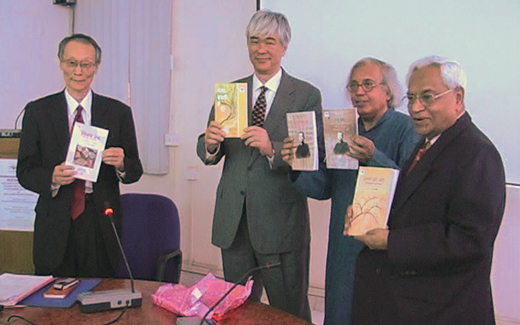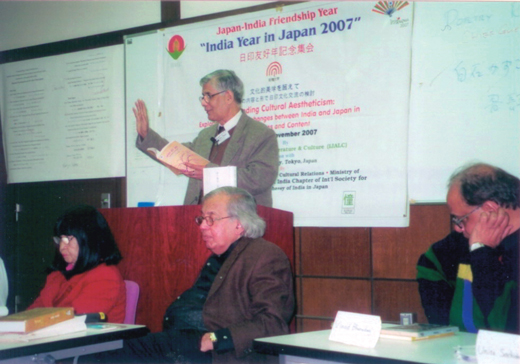
(From L to R) Professor Mochizuki, Mr. Endo, Sri Ashok Vajpeyi, and Sri Arjun Asrani releasing the books
Part II (Tokyo chapter) was held during November 23-25, 2007 at the Takushoku University, Japan. A delegation of 7 poets and 3 scholars of Japanese and Indian literature went to Japan. A large contingent of Japanese poets, scholars and poetry performers from the International Japanese Research Centre, Kyoto, Iwate University, Japan’s poets club, Haiku club of Japan, Takushoku University, Toyo University, Daito Bunka University, Kokugakuindaigaku University, Osaka University of Foreign Studies, Kobe Women’s University and freelance poet and writers, Mr. Hokke Shigeki and Ms. Toshiko Miyachi, and Chikae Taniguchi, Director, International Exchange, Japan Poet Club, also attended and actively participated in the proceedings. A contingent of Indian research scholars of Japanese literature currently in Japan also attended the conference. Professor Suzuki Sadami, in his Keynote address, provided an overview of poetic trends, traditions and developments in Japanese poetry and Tagore’s influences on it. He also explored the interactions between Tagore and Okakura Tenshin and Noguchi Yonejiro in this context. The Keynote Address from India was delivered by Sri. Ashok Vajpeyi, who discussed developments in contemporary Indian and Japanese poetry in a comparative perspective and also highlighted the contributions of Agyeya in the context of Indo-Japan literary relations, Dr. Unita Sachidanand presented an overview of developments in Japanese poetry studies, research and translations in India.
b) Books on Indo-Japan Poetry: A set of five books on Indo-Japan poetry edited by Unita Sachidanand and Mochizuki Yoshitsugu was released in commemoration of the Indo–Japan Friendship Year 2007. The unique feature of these books is that they are bilingual: in Hindi and Japanese both. The book: Ganga bahti hai tr. Ganga wa nagareru takes the reader on the poetic journey of the Holy Indian River Ganga through a collection of Japanese and Indian poems. A collection of Indian Haiku rendered in original and their Japanese translation by the title Nikat hum (Chikazukeri), and ‘Anant Ki Or’, a collection of Hindi poems translated into Japanese provides a kaleidoscope to Indian poetic aestheticism. The fourth and fifth books are translations of Ishikawa Takuboku’s Tanka rendered into Hindi. The Indian delegates presented a set of five books to Professor Suzuki Sadami at Tokyo to mark the occasion and a gesture of continuing literary exchange between India and Japan.
c) Special Session on Poetry Recitation (Kavi Sammelan)
A special session both at the New Delhi and Tokyo chapters was dedicated to recitation of original and translated verses in Japanese, Hindi, and some of the Indian languages such as Telugu, Bangla, Sindhi, and Himachali. The session in New Delhi was chaired by Sri Prayag Shukla while Sri Ashok Vajpeyi conducted the proceedings at the Tokyo meet. A large number of Japanese and Indian poets, scholars and translators recited their poems. These included Katsuhiko Hamakawa, Arima Takashi, Dhyaneshwar Mulay, T. Hoshina, Yoshio Takakura, Mohini Hingorani, George P.A., J. Bapu Reddy, Bidhan Dutta, Anand Prakash, Raj Buddhiraja, Reeta Rani Paliwal, Krishna Dutt Paliwal, Anita Khanna, Priyadarshi Mukherjee, Janashruti Chandra Seth, Mangalesh Dabral, Hemant Joshi, Ibbar Rabbi, Prempal Singh and several others. The Tokyo meet saw active participation of Japanese poets and scholars: Shiraishi Kazuko, Chikae Taniguchi, Ikeuchi Teruo, Emiko Miyashita, Prayag Shukla, Y. Mochizuki, Manglesh Dabral, Hokke Shigeki, Ganga Pd Vimal, Varyam Singh, Fumiko Mizukawa, Ranjit Saha, Suresh Salil, Vinod Bharadwaj.

Prof. Ganga Pd. Vimal reading his poems from “Anant ki Or” while Ms. Kazuko and Sri Vajpeyi listen